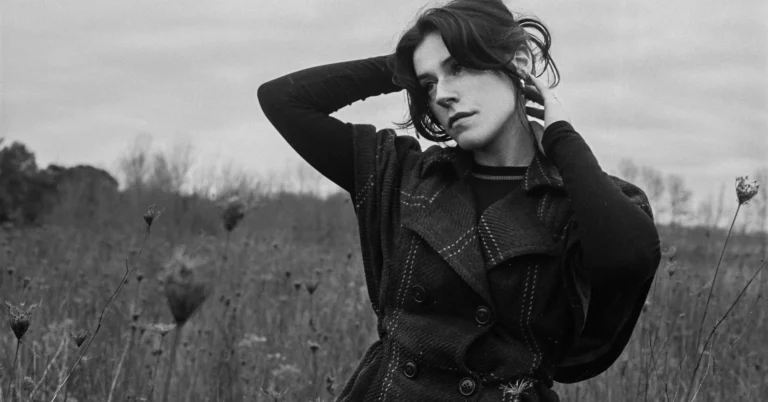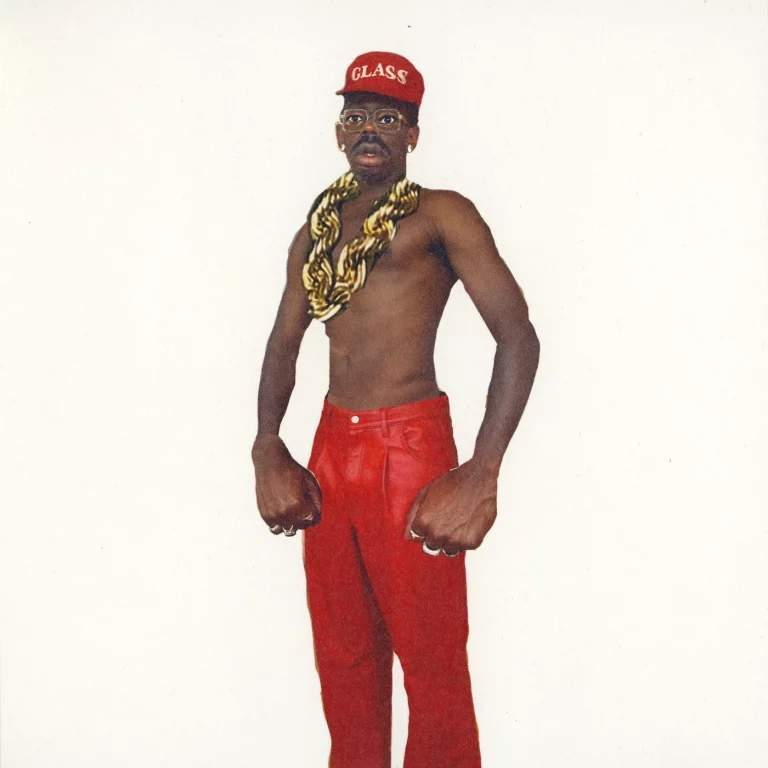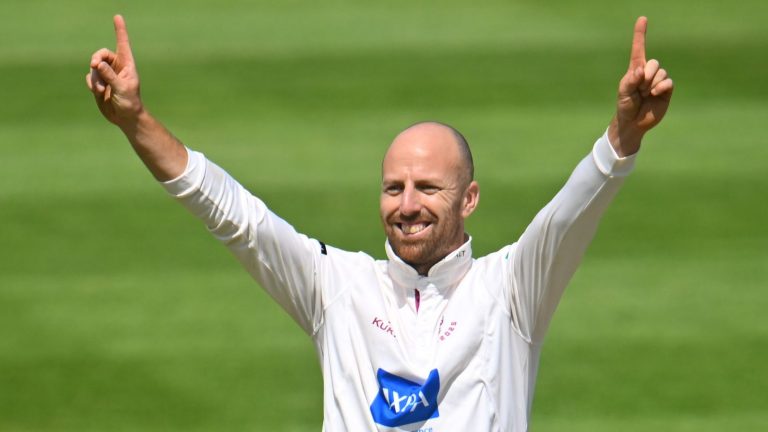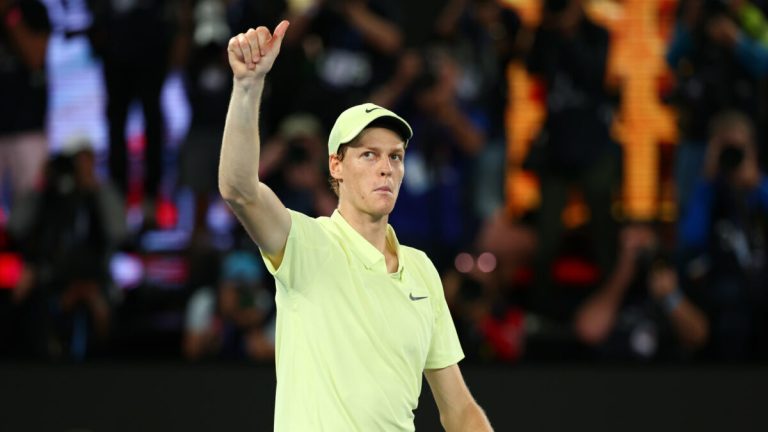In the world of Great Grandpa‘s Patience, Moonbeam, things can move at lightning speed. “It’s perfect when I leave you, damn,” goes a gut-churning line on album centerpiece ‘Doom’, before ‘Task’ frames the feeling of perfection through a more familiar and grounded lens: the kind of song you sing along to. “It’s out of mind/ Those things that hurt us/ It moves right through/ The things we made/ It’s like there’s only sun/ All the darkness here is gone,” Al Menne sings, and another run of group vocals soon provides the evidence. ‘Task’ did not start as a song about the Seattle-founded quintet’s artistic and personal reunion; ‘Doom’, open to interpretation as it may be, was certaintly not written as its point of contrast. No one left the band – still comprising Pat and Caroline Goodwin, Al Menne, Dylan Hanwright, and Cam LaFlam – in the time since 2019’s Four of Arrows, though periods of creative uncertainty and geographical separation at least partly contibuted to the wait between albums. Carefully constructed, collaborative, and cohesive, Patience, Moonbeam allows each member to reorient their timelines, infuse intimacy with drama, and filter their personal experiences through history, mystery, and above all, community. And so, even as they question the very nature of it, Great Grandpa prove themselves up to the task.
We caught up with Great Grandpa’s Pat Goodwin and Cam LaFlam and to talk about every song on their new album, Patience, Moonbeam. Read our track-by-track breakdown and listen to the album below.
1. Sleep
Tell me about the decision to open the record with an instrumental, as opposed to having something like the piano interlude on Four of Arrows in the middle of it.
Pat Goodwin: I always imagined that ‘Sleep’ was part of ‘Never Rest’. The fact we split it up – I don’t know if we ever even had a conversation about this in particular. But we live in a world of instant gratification, and I think people are very terrified of not hooking people right away. We wanted to give the listener a bit more benefit of the doubt, or trust them a bit more that they wouldn’t just turn it off after 10 seconds because they’re like, “Well, this is just some boring instrumental track, I’ll never listen to the rest of this.” I do think most listeners are more savvy than people give them credit for, and that they will have that patience. And if somebody doesn’t, that’s okay. Maybe the record is not for them. I think the record is about longer payoffs – about investment, and then having that come later, which is kind of antithetical to the way our culture works these days. Even us taking so long to make it, I think, is part of that. Just having the confidence on our end to feel like we can do something that maybe is not an intelligent choice from a marketing or branding or PR standpoint but serves the larger narrative of the album.
All of us, for the most part, have some sort of tenderness or love of more progressive or avant-garde or experimental music. There’s obviously so many great records that give you that sort of introduction to the world, that guides you in gently– this used to obviously be more of a hallmark of records back in the ’60s and ’70s. If you look at Pink Floyd or even pop artists like Elton John, they’d do stuff like this where there’d be these extended intros that set the stage in a more theatrical way. And I do think people are more scared of that now.
2. Never Rest
‘Never Rest’ introduces this idea of patience, or being “patient-eyed,” counteracting with a restless kind of yearning. It’s also interesting how “I never rest, only sleep” comes into contrast with the previous album, which was named after the tarot card symbolizing rest.
PW: That’s a great insight. I’m glad you picked up on that. I feel like talking about this stuff, there’s always a fine balance between wanting the listener to discover the puzzle or unravel it themselves. We talk about this a lot ourselves: How much do we want to hand-hold people, or be super literal about talking about these things upfront? But I always feel much more open to talk about it in interviews like this, where there’s this sense of the person having dug into it, and there’s a sense of appreciation or understanding already for that. But we want to give people that space.
I saw somebody note that the record starts with a birth and ends with a death – there’s this cyclical thing. It’s a motif we’ve explored a lot in our music: the push-and-pull between the high energy and the low energy, of resting or working. I think for a lot of us in the band who have more dysregulated mood stuff, it’s very much part of our reality. Sometimes I’m hyper-productive and have an outpouring of creativity, and other times I’m very subdued and retreat a bit. I think the beginning of ‘Sleep’ leading into ‘Never Rest’ is this moment of real tension in my life, of becoming a parent. Like, there’s this birth coming, and feeling unprepared, feeling scared in a way. So much of my identity and my sense of self comes from the creative labor of making art like this, and I think I had a sense that I would be losing that, almost, if I became a parent. That all of my time, and the real labor that goes into making art, would be sort of taken away by becoming a parent. I’m not afraid to say, I was very terrified.
I think it very much came from an authentic place of feeling that tension mixed with that excitement of this transformative thing, and trying to wrestle with that. That’s kind of the core spirit of ‘Never Rest’ – that wrestling with letting go. Because, in many ways, I think to be an artist requires a sense of selfishness. I mean, what you make in the end could be argued to have more selfless qualities, because other people enjoy it and appreciate it. But often, to create it is a very selfish thing and requires a lot of sacrifice from others around you, just because of the amount of emotional and literal time that is required for its creation.
3. Junior
I think ‘Junior’ provides traces of a story to the foreboding atmosphere that you’ve built up by this point, but it still has a light and feathery touch to it. How do you think it works in the context of the album?
Cam LaFlam: I think it has an immediacy to it, coming out of ‘Never Rest’. There’s some real crisp vividness to the lyrics, but also a certain energetic element to the song that carries it all the way through. I feel like that was something I tried to bring in terms of the drums, that driving energy. It’s one I’ve really been enjoying playing as a group.
PG: I’ve been going back and forth about talking about this song in more depth. When I was writing it, because I was so steeped in the world it’s derived from – it’s actually based on historical events and people – I felt like when I finished it that it was quite literal, and everyone would know exactly what it was about. But then no one’s picked up on that. I never wanted it to be too on the nose, that it was something people would come to on their own. So at this point, I’m more curious to lay some of the seeds for people to explore that a bit more, which ties into the songs in the record.
At least for my own songs on this record, I like that idea of starting very personal and then closing that loop. So, ‘Never Rest’ is a very personal song, and ‘Kid’ is a very personal song, In the past, I’ve always written much more small, very personal, internal types of songs, and I really wanted to push myself to get out of that and try exploring different styles, maybe more narrative, fictional characters. Trying out topical songs, different sorts of songwriting paradigms. So with the middle of the record, I really wanted to sandwich a lot of that in. And one of the big things sort of in the middle of the record for me is this – I’ve been calling it like the “cult trilogy,” and that’s ‘Doom’, ‘Emma’, and ‘Junior’, and they all are tied together.
‘Junior’, in so few words, is really based on the life of Joseph Smith, the Mormon prophet. I listened to this podcast that is incredibly fascinating. The person who writes the podcast and presents it is an ex-Mormon who grew up in the church and then became sort of a historian of the Mormon faith and is quite literal and factual about the actual history of what happened, how this religion or this cult – depending on your perspective – came to be. And it’s stranger than fiction, right? The cast of characters and some of the events that happened are pretty inspiring from a creative standpoint. After listening to it, I was like, “This is such rich source material.” You look at a film like The Master, which was of course based on L. Ron Hubbard, and I always thought that was a very elegant exploration of that. So I was hoping to kind of do something like that in more lyrical form on this record. There’s obviously my own biases, but I want to keep it in a way detached from the whole thing and more tender.
‘Junior’ is more about Joseph Smith, first from his father’s perspective in the first verse, and then the second verse is from his own perspective. Because it’s always interesting with these kinds of people: How much of it do they truly believe versus how much of it is part of some sort of manipulative grift? I think there’s always an element of both with many cult leaders, where I think they do believe it to some extent, but there’s also a sense that they are just a manipulator. I wanted to try to walk that line of keeping that sort of human aspect of it, of what really what happened in his life, and falling in love with Emma, who is his first wife. That’s what the next song is about: a love letter from Joseph Smith to his wife.
4. Emma
The intimacy of it is curious and human, but also unnerving and open-ended.
PG: There’s this anxiety, right? I believe that Joseph Smith did have a genuine love – despite having more wives later in his life – for Emma, and that she was in a way singular and special. But being this first love and someone who was fundamental to his growth as a cult leader and was there from the very beginning – mixed with the fact that he’s building this sort of empire on lies – how do you reckon with that? There’s this awareness that he’s building this whole house of cards, and how do I protect this person that I love or keep that from them? I wanted to really try to find a way to approach that with a sense of tenderness but also unease. It’s like Breaking Bad or any of these things where these people get so deep into the lie that the illusion they’re putting up to the ones they love just starts to weigh on them more and more. I wanted to bring that across both in the sound of the song but also in those lyrics.
CL: When we worked on ‘Emma’, we developed it from Pat’s idea relatively late in these songs. And the connection that emerged in the melodic element between ‘Emma’ and ‘Doom’ goes back again to these connections Pat’s been speaking to.
5. Ladybug
I know Al and Dylan both contributed lyrics to the song. I’m curious if the collaborative process was as playful as the song sounds.
CL: For sure, yeah. We took it through a number of iterations. It had its very initial building blocks, and then over several years, we constructed several different pieces of architecture. Whether in some of the little loops and hooks that we discovered along the way, or the shouted vocals – I remember recording those and having a blast.
PG: It was something lyrically that I struggled with for a long time. Eventually, it gained this sense of confidence, of leaning into the sort of hedonistic quality of it. I do think the pursuit of happiness – because that’s kind of the point of the song – everybody’s familiar with the general message there. But the song that I really like to point to for this one, and I like the way they speak about it, is ‘Catching Smoke’ – it’s a King Gizzard song off Butterfly 3000. I remember reading a press thing once about that, and them just talking about how they really wanted to shamelessly make something hedonistic, that’s just about the ecstatic joy of taking drugs with your friends and not overthinking that. Just trying to capture that lightning-in-a-bottle thing.
I think I was fighting the natural energy of the song, trying to turn it into something it wasn’t. And then when I came back and started working on the lyrics the second time, I sort of leaned into the origin of the song, which was really about a friend and I taking acid and stumbling into a wedding in a park – we didn’t know the people there, we just happened upon it and became a part of this wedding while we were tripping. It was just a very surreal and funny experience, something incredibly memorable. But it’s one of those things where, like anything, these moments are incredibly fleeting, and they’re artificial in a way. The drugs are not an actual path to happiness – it’s a transient thing, not a long-term, deeper wellness. I’m pretty into meditation and trying to find that contentment in the baseline. But of course, like anyone else, I’m attracted to that appeal, and historically was a lot more when I was younger – trying to chase those highs, the rush, the excitement. And that’s something that never truly brings a lasting sense of peace or happiness.
I wanted to ride that line of worshiping and expressing a love for those moments, while also keeping them at a distance and saying, “This is something that’s not necessarily good for me or what I’m actually seeking.” This was so fun, and this moment was really meaningful, yet I don’t want this to be something I’m seeking out.
6. Kiss the Dice
This is one of the subtler songs on the record, yet still gestures at something profound. Cam, can you speak to the detail in the background instrumentation of the track, especially the percussion?
CL: Al was the primary songwriter for ‘Kiss the Dice’, and it was one that I think pretty immediately we just responded to. With the drums, I remember one phase of working on this record – we were doing some writing/arranging pre-production at this great studio in Anacortes, Washington, called The Unknown, and I believe that was the space where we were doing some exploration for ‘Kiss the Dice’. With Dylan leading much of the production and engineering of this album, we ended up pulling some drum pieces from those sessions, which I think really served well for ‘Kiss the Dice’. Just one element of Al’s brilliance as a songwriter is their ability to construct a song that feels so full and meaningful but also can carry brevity. There’s really an immediacy to that song for me. It felt like the right place for some more subtlety there, like you said, coming out of ‘Ladybug’.
PG: I do think immediacy is the key word. It really came together so quickly. So many songs went through lots of iterations and maybe are even overwrought in a sense. Even in Al’s performance, where he cuts loose a bit, there’s just something about that rawness that feels really refreshing, and a really good foil to some of the other stuff, which is more orchestrated and has an almost over-perfectionist precision.
7. Doom
How much can you tell me about this song as a conclusion to that trilogy, without necessarily giving a definitive narrative?
PG: It’s one where I do like the idea of it being more of a cryptic piece of the puzzle. The one thing I feel more comfortable giving as a clue to people if they want to dig into that world: it’s taking a lot of the concepts of what constitutes a cult, and how is a cult made, how that transforms people, and applying that to a more modern lens. It’s more our world as opposed to the world of, like, the 1830s. It’s kind of expanding on some of those themes explored, but from a more contemporary lens. And the other underlying theme in that one as well is The Green Knight, the Arthurian lore. So there’s a mixture: exploring the earlier stuff through a more modern lens, but also an even more ancient one as well.
8. Task
The song has this perfectly down-to-earth and kind of pure euphoria that’s maybe not fully realized in ‘Ladybug’. I love how it takes this curious turn at the end that explains the title but also makes you wonder about the connection between those parts.
PG: This is one of those things where the creation of the song informs the story – the song itself is almost like a document of its own creation. Because originally, I had written the music for it, and I had scratch lyrics, but the very end – “Tell me what my task is” – when I wrote that, it was when we were at our point of least certainty, if we were ever going to make more music together. This is when we were living abroad, and the band was basically fully in hiatus mode. I had this deep sense of lack of purpose – I was trying to write songs, and I didn’t know how they would be made, who I would make them with. It just felt like Great Grandpa was such a core part of my own musical identity for the last decade, and it felt very much like there was this void, and I didn’t know what to do.
When we did start making music, and I brought that to the group, I didn’t really know how to finish it. Al was like, “I’ll write lyrics for this,” and then wrote all the beautiful lyrics for the whole rest of the song, which ended up becoming this story about our reunion in that time, us coming back together and reaffirming our friendship and our love, and how the art binds us. And it’s so beautiful – there are just such wonderful lyrics. It’s such a treat to collaborate with him on that, and I think everybody brought a real sense of reverence at the end. It almost felt like a ritual when we performed it as a group.
This is a song that we actually did with Mike Davis and Sam Rosson, and they were very instrumental in the sound and aesthetic of this song. They did this really beautiful scene-setting in the studio, it was very aesthetic and very vibey. I think we all felt like this was a healing or important moment for us as a group, singing this all together.
CL: I think there is – you sort of described it this way earlier – a certain groundedness to the joy of the song, if we were to contrast it with something like ‘Ladybug’. And I think that feeling maybe comes through because of what Pat was just speaking to. The end of the song, when we’re all singing together – we’ve been doing that live, and that’s always been a cool, special moment to share.
9. Top Gun
I know neither of you is credited on this one specifically, and Al wrote the lyrics, but I’m curious how they resonated with you.
CL: I can’t really speak to the lyrics too much, but again, the specificity of Al’s lyrics is so well done. And I really like it being side by side with ‘Task’.
PG: This is something Al just does so well as a songwriter, is set a mood. There’s just a deep nostalgia to that song, something that feels warm and comforting and bittersweet. It’s kind of that Mono no Aware concept, which we literally have a song about. There’s something about the tenderness of the production and the presentation of it that feels super humble in a really good way.
10. Patience, Moonbeam
PG: I think Dylan found that in a session – it came from the ‘Task’ session, actually. I’m pretty sure it was just something that Mike Davis, who produced ‘Task’, had made as a background loop or sample. When we were digging through the ‘Task’ session later, adding more to it, we stumbled on that and were like, “Oh, this is really cool – let’s just put it on the record somewhere as a little moment of peace or transition.” I do think it would have been kind of jarring coming right out of the folky, rootsy thing of ‘Top Gun’ right into ‘Ephemera’ without some kind of transition.
11. Ephemera
Cam, I know you wrote the lyrics and the music for this one, and I just realized its connection to ‘Ladybug’ in terms of the idea of transience. What prompted this meditation for you, while also leaning into more of a trip-hop vibe?
CL: As it often goes for me when writing songs, the vocal melody come first, sometimes placeholder lyrics. The specific origin point of writing ‘Ephemera’ was just some piano chords and the vocal melodies for the song, and it sat for quite some time just as that. Revisiting it within the context of working on this record together, I started working on the lyrics, just kind of exploring what the world is, sonically speaking, that I thought might serve the transitory nature of experience that I’m getting into – the mystery of that, the frustration of that, the joy of moment to moment. Portishead ended up being a reference point as a band that, broadly speaking, construct some really vivid, specific worlds – something mysterious and a bit hazy and groovy. Dylan was instrumental in helping produce and develop that arrangement and inform that world, knowing that it just followed that feeling.
12. Kid
When you released that song eight months ago, it marked your first song in five years. I’m curious how you decided to include it as the last song on the record.
PG: I kind of like the reverse timeline of the record in that sense, where that’s actually one of the oldest songs. And, in terms of our own personal journeys, it’s the first thing sequentially and kind of what kicks off a lot of the spirit of the record. For both Carrie and I, writing stuff for this record – so much of it is about our journey to becoming parents. We started the record with zero children, and now we have two. A lot has changed. And that was the first part of that journey – going through that really awful process of… we actually had several miscarriages trying to have our first child. That informed so much of what we were writing in the process.
But it felt weird to start the record like that. The song ends on this somewhat hopeful note – it’s very muted and reserved, in a way, but there’s this sense of optimism, that there is meaning to the suffering. I think that’s a big theme in the song. Switching up the timeline just made more sense spiritually, to start with the birth, with the change really happening, and then revisit the challenge of getting to that point later, with that perspective of: It did work out. I liked that reframing.
I also think there was maybe a sense of, this is something we’ve had out for a long time, we don’t necessarily need to lead the record with it. People will already be very familiar because it’s been a single for almost a year. It won’t necessarily suffer by being at the very end of the record, and I think it was an anchor pulling people through the rest so they didn’t burn out after the first three songs, as people often do.
You described the hope at the end as muted and reserved. What resonance has it taken on for you now? Has the intensity of it changed?
PG: I wish Carrie could be here to put this in her own words, but I’ll try to paraphrase. For her, she can’t listen to that song – she still can’t. It’s too painful. The experience is still too raw years later, and just listening to the song conjures up a lot of those emotions. I feel like we have a complicated relationship with it because it’s definitely our most heart-on-the-sleeve, truly personal song in a very pure and uncool sense. It’s not really veiled or cryptic or even – it’s just blunt in a way that feels hard sometimes to look at it. Despite its grandeur and all these other things, I think the fact that it became the backdrop of that narrative has made it a complicated thing for us to return to or even sit with too much. I don’t listen to that song very often. I’ve listened to it during the recording process and maybe a few times after it was done, but it’s a hard one to listen to, for sure.
This interview has been edited and condensed for clarity and length.
Great Grandpa’s Patience, Moonbeam is out now via Run for Cover.








